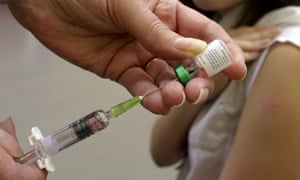Who Should Be Blamed for Low Vaccination?

The issue of lowering take-up of vaccinations for measles (MMR 1 and 2) is disturbing and serious (The rising toll of measles: nearly 10m cases and 142,000 deaths, 6 December). However, it is far too easy to blame parents and social media for the problem.
Research that we conducted at Lancaster University in conjunction with Central Lancashire Primary Care Trust (PCT) a few years ago revealed that there was little evidence of systemic hostility to these vaccines among parents of children who had not completed their vaccination programme by the age of five. Rather, the main problems centred upon the delivery of the service itself.
Parents of children who had not received all their vaccinations reported that they had not received letters asking them to attend clinics for these vaccines or, if they had, that it was extremely difficult to attend or to reschedule appointments. As always, the delivery of healthcare was designed to suit staff rather than patients. The facilities at many clinics were reported by such parents as poor and the waiting times far too long. Mothers with more than one child found this particularly off-putting.
The PCT used these findings to set up teams of dedicated health professionals to visit the homes of children who were listed as not having the full complement of vaccinations. During these visits most parents agreed to have their children immunised and rates of MMR2 uptake in particular rose significantly.
With cuts to public health budgets, it is unlikely that such a strategy would be considered currently but the health service needs to recognise its own role in these issues as opposed to – rather conveniently – blaming parents for reading social media.
Roger Penn
Emeritus professor of sociology, Queen’s University Belfast
Roger Penn
Emeritus professor of sociology, Queen’s University Belfast
• Join the debate – email guardian.letters@theguardian.com
• Read more Guardian letters – click here to visit gu.com/letters
• Do you have a photo you’d like to share with Guardian readers? Click here to upload it and we’ll publish the best submissions in the letters spread of our print edition
You've read 111 articles...
... in the last two months, so we hope you will consider supporting our independent journalism today. More people, like you, are reading and supporting the Guardian’s independent, investigative journalism than ever before. Unlike many news organisations, we made the choice to keep our reporting open for all, regardless of where they live or what they can afford to pay.
The Guardian will engage with the most critical issues of our time – from the escalating climate catastrophe to widespread inequality to the influence of big tech on our lives. At a time when factual information is a necessity, we believe that each of us, around the world, deserves access to accurate reporting with integrity at its heart.
Our editorial independence means we set our own agenda and voice our own opinions. Guardian journalism is free from commercial and political bias and not influenced by billionaire owners or shareholders. This means we can give a voice to those less heard, explore where others turn away, and rigorously challenge those in power.
We hope you will consider supporting us today. We need your support to keep delivering quality journalism that’s open and independent. Every reader contribution, however big or small, is so valuable.





.jpeg)
Comments
Post a Comment